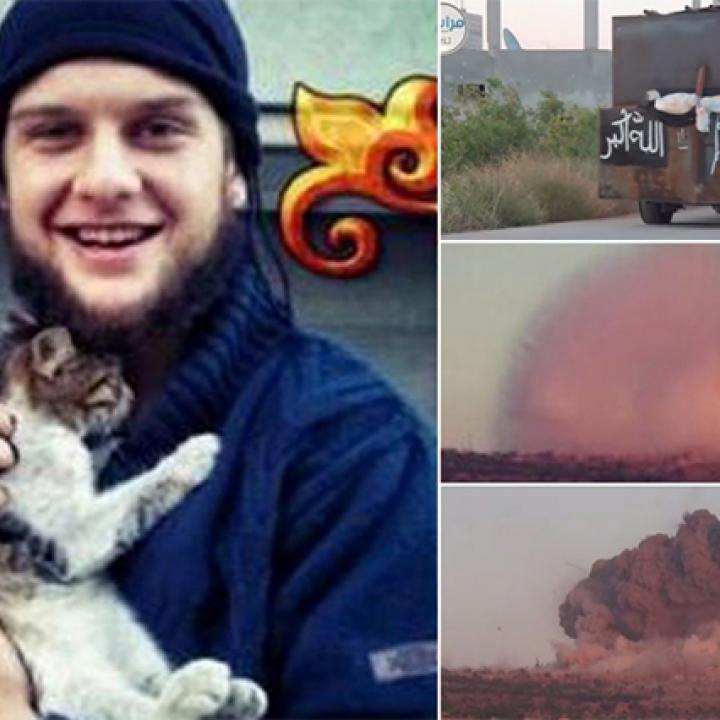

The death of operative Fawzi Ayoub shows the extent of Hezbollah involvement in the fight.
The war in Syria threatens to tear the region apart along sectarian lines, leading to a sharp rise in violent extremism from within both the radical Sunni and Shiite camps. Syria's neighbors bear the immediate brunt of the conflict, as they struggle to contend with the steady stream of refugees flowing across their borders. But the repercussions of the war in Syria are being felt far beyond Syria's borders. Last week, two events drove this point home for policymakers in very specific ways.
On May 25, Moner Mohammad Abusalha, an American in his early 20s from South Florida, became the first American suicide bomber in the Syrian jihad. Less than 24 hours later, Fawzi Ayoub -- a senior Hezbollah commander who once lived in the United States and Canada, was a naturalized Canadian citizen, and was featured on the FBI's most wanted terrorist list -- was killed in a rebel ambush.
Abusalha appears to have radicalized over a short period of time, an increasingly typical phenomenon within the Sunni extremist milieu. Ayoub, however, was a longtime Hezbollah operative. The common thread between the two is the sectarian nature of the open-ended war in Syria. Since both Sunnis and Shiites see the war in existential terms, the longer the war persists the more foreign fighters it will draw to Syria.
According to law enforcement officials, dozens of U.S. and Canadian residents -- some 30 from Canada and as many as 100 from the United States -- have gone to fight in Syria, the vast majority joining Sunni rebel groups, including al-Qaeda affiliates such as the Nusra Front and Islamic State of Iraq and the Levant (ISIL). Abusalha's truck bomb struck a Syrian military position in Idlib Province, in an attack that reportedly involved three bombers and tons of explosives, and was claimed by two groups, including the Nusra Front.
U.S. intelligence has concluded that some of the groups fighting in Syria aspire to attack the United States. Consider the case of Abd al-Rahman al-Juhni, a U.S.-designated al Qaeda operative who, as of mid-2013, "was part of a group of senior al-Qaeda members in Syria formed to conduct external operations against Western targets." For the FBI's newly minted Director, James Comey, the bureau's directive is clear: "We are determined not to let lines be drawn from Syria today to a future 9/11."
But Sunni extremism is only one side of the radical equation in Syria. In March, FBI agents arrested Michigan-based Mohammad Hassan Hamdan at the Detroit Metropolitan airport as he attempted to travel to Syria to fight alongside Shiite Hezbollah.
Several hundred Hezbollah operatives have died fighting for the Assad regime, but few could boast the resume of Fawzi Ayoub. He joined Hezbollah in the early 1980s and was soon dispatched to carry out operations abroad, including a 1987 Hezbollah plot to hijack an Iraqi airliner departing from Bucharest. He next appeared on the radar in Canada, where he gained citizenship. Ayoub worked as a grocery clerk by day, took classes at night, and married an American woman. At one point, the couple lived near Dearborn, Michigan. He later would infiltrate into Israel through Europe to carry out a bombing plot there, and served time in both Palestinian and Israeli jails before being returned to Lebanon in a prisoner swap. Hezbollah leader Hassan Nasrallah waited on the tarmac to greet and embrace him on his arrival in Beirut. The death in Syria of a person of Ayoub's stature within Hezbollah demonstrates the extent to which Hezbollah has gone "all-in" in its defense of the Assad regime.
Neither the U.S. nor Canada is immune from the repercussions of the fighting going on in Syria today. Las Vegas rules don't apply to Syria. What takes place there won't stay there.
Matthew Levitt is the Fromer-Wexler Fellow and director of the Stein Program on Counterterrorism and Intelligence at The Washington Institute. His latest book is Hezbollah: The Global Footprint of Lebanon's Party of God.
National Post



